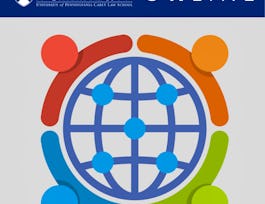This course explores how statutes, regulations, common law, and market forces help or hinder three major goals of policy makers: increasing access, reducing cost, and improving quality. We will examine the Supreme Court’s rulings on the ACA and other legal aspects of modern health care reform. Learners who successfully complete this course will be able to describe the laws, regulations, common law and market forces that shape our health care system and identify areas where ideas and innovation are needed; explain the malpractice system and how it influences medical practice; and analyze legal aspects of the ACA.


U.S. Health Law Fundamentals
This course is part of Healthcare Law Specialization
Taught in English
Some content may not be translated

Instructor: Theodore Ruger
9,056 already enrolled
Included with 
Course
(219 reviews)
What you'll learn
Identify the distinguishing features of the American healthcare system and the role of administrative law in modern medical care
Understand the history, scope, and limits of conscientious objection
Define the basic medical malpractice standard used in the U.S. legal system
Understand the role of the federal government in administering Medicare and Medicaid
Details to know

Add to your LinkedIn profile
4 quizzes
Course
(219 reviews)
See how employees at top companies are mastering in-demand skills

Build your subject-matter expertise
- Learn new concepts from industry experts
- Gain a foundational understanding of a subject or tool
- Develop job-relevant skills with hands-on projects
- Earn a shareable career certificate


Earn a career certificate
Add this credential to your LinkedIn profile, resume, or CV
Share it on social media and in your performance review

There are 4 modules in this course
This introductory module begins with an overview of the U.S. legal system as context for the complex patchwork that is U.S. health law. We then look in detail at how administrative law functions to regulate modern medical care. Then we take a close look at our first specific law - EMTALA, which guarantees screening and stabilization in emergency situations.
What's included
6 videos3 readings1 quiz2 discussion prompts
The second module closely examines the doctor-patient relationship: how it is formed, terminated, and in some cases, abandoned. We then examine the rise of conscientious objection as a right of medical providers.
What's included
4 videos3 readings1 quiz1 discussion prompt
This module explores the various mechanisms in place to ensure quality control in the U.S. healthcare system, including licensure and accreditation as a preventative measure, and tort law and liability as a remedial measure.
What's included
5 videos2 readings1 quiz1 discussion prompt
This final module focuses on the role of the federal government in administering Medicare and Medicaid as well as the effects of the recently passed Affordable Care Act.
What's included
5 videos3 readings1 quiz
Instructor

Offered by
Recommended if you're interested in Healthcare Management

DeepLearning.AI

University of Pennsylvania

University of Pennsylvania

University of Pennsylvania
Why people choose Coursera for their career




Learner reviews
Showing 3 of 219
219 reviews
- 5 stars
93.18%
- 4 stars
5%
- 3 stars
1.36%
- 2 stars
0.45%
- 1 star
0%
New to Healthcare Management? Start here.

Open new doors with Coursera Plus
Unlimited access to 7,000+ world-class courses, hands-on projects, and job-ready certificate programs - all included in your subscription
Advance your career with an online degree
Earn a degree from world-class universities - 100% online
Join over 3,400 global companies that choose Coursera for Business
Upskill your employees to excel in the digital economy
Frequently asked questions
Access to lectures and assignments depends on your type of enrollment. If you take a course in audit mode, you will be able to see most course materials for free. To access graded assignments and to earn a Certificate, you will need to purchase the Certificate experience, during or after your audit. If you don't see the audit option:
The course may not offer an audit option. You can try a Free Trial instead, or apply for Financial Aid.
The course may offer 'Full Course, No Certificate' instead. This option lets you see all course materials, submit required assessments, and get a final grade. This also means that you will not be able to purchase a Certificate experience.
When you enroll in the course, you get access to all of the courses in the Specialization, and you earn a certificate when you complete the work. Your electronic Certificate will be added to your Accomplishments page - from there, you can print your Certificate or add it to your LinkedIn profile. If you only want to read and view the course content, you can audit the course for free.
If you subscribed, you get a 7-day free trial during which you can cancel at no penalty. After that, we don’t give refunds, but you can cancel your subscription at any time. See our full refund policy.

